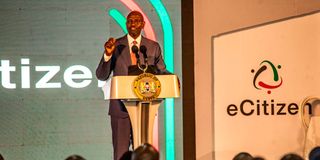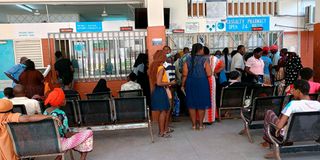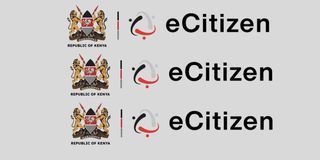
President William Ruto during the launch of e-Citizen services, GavaMkononi app and Gava Express at KICC in Nairobi on June 30.
Non-tax revenue for nine months ended March 2025 more than doubled on the back of President William Ruto’s renewed order on parastatal chiefs to surrender idle cash in accounts amid continued digitisation of State services, the National Treasury has reported.
The receipts, which largely comprise cash generated from provision of government services, surplus funds from State entities and dividend on government investments, surged 135.15 per cent year-on-year to Sh122.31 billion from Sh52.01 billion the year before.
Treasury said the performance reflects inflows from licences and permits under Traffic Act such as driving licences, land revenue such as title deeds, and surplus funds from Semi-autonomous Government Agencies (SAGAs).
Other key sources are fines and forfeitures, royalties as well as revenue generated from provision of services under the Interior and Citizen Services departments such as the issuance of birth and death certificates, passports, and work permits.

Long queues were witnessed at the Coast General Teaching and Referral Hospital in Mombasa after the roll out of payments for services through the e-Citizen platform.
“The key sources under the non-tax revenue are investment income, surplus funds, and interior and citizen services revenue,” Mr Albert Mwenda, director-general for Budget, Fiscal, and Economic Affairs at the Treasury, told us earlier.
The increased collections from non-tax revenue streams has helped ease cash flow pressure for Treasury in a period tax receipts grew a modest 2.89 per cent to Sh1.58 trillion in the review period.
Idle cash
Dr Ruto has been adamant that State-owned entities surrender idle cash in their accounts to the exchequer to ease cash flow woes amid gaping shortfalls in tax collections.
Treasury Cabinet Secretary John Mbadi doubled down on this directive earlier this financial year, warning chief executives of State-owned entities against spending surplus money on buying of assets such as land, machinery, and buildings without prior approval.
Chief executives of SAGAs such as Central Bank of Kenya, Capital Markets Authority, Kenya Ports Authority, Kenya Pipeline Company, Competition Authority of Kenya, Communications Authority of Kenya and National Transport and Safety Authority are required to wire 90 per cent of excess money to the exchequer.
Fines
The agencies generate billions of shillings annually from charges on offering government services such as licences and fines for lawbreakers.
The Public Finance Act requires they retain 10 per cent of operating surpluses as reported in audited financial statements while remitting the remainder to the government’s main account through the Kenya Revenue Authority.
“However, it has been noted with concern that some Regulatory Authorities are adjusting operating surplus by providing for capital expenditure to determine the 90 per cent to be remitted to the National Exchequer,” Mr Mbadi wrote in a circular to the chiefs of State Corporations.

The State’s e-Citizen payment platform.
The government has also moved most of its services to an online portal, e-Citizen, in a bid to improve efficiency and seal loopholes for bribery and other forms of corruption.
Some 20,855 government services had been on-boarded on the e-Citizen platform by last December, according to President Ruto, in a bid to streamline access to government services and official payments into a single-pay bill.
‘Revenue collections through the platform have grown significantly, enabling the government to mobilise critical resources for public projects,” the President said last November. “E-Citizen is not just a digital service delivery platform; it represents a paradigm shift that has redefined public service delivery in Kenya and profoundly impacted lives.”










